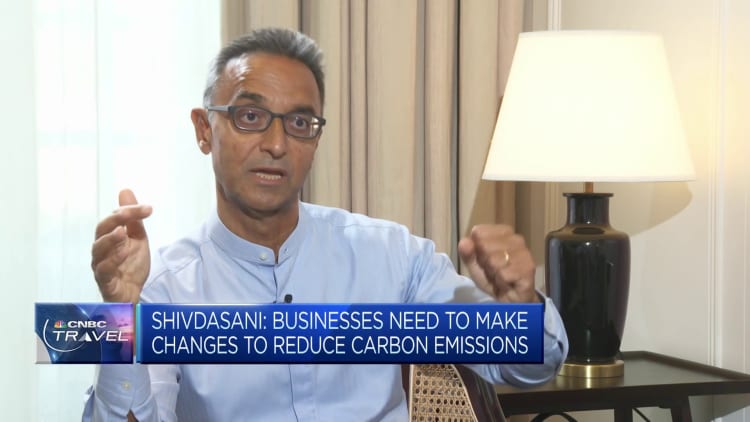Many hotels claim to be eco-friendly.
But are they?
A quick-and-easy test is to look for two items, said Sonu Shivdasani, founder of Soneva and Six Senses hotel brands.
First, sustainable hotels should not have branded water of any sort, he told CNBC Travel.
“When you have incredible filtered water, and where the tap water is pretty pure in most countries in the world … there’s no need to have any sort of branded water,” he said.
Not only does this reduce single-use bottles, but it’s healthier too, he said.
“There are quite a lot of brands of water that can be quite toxic, because they’re in areas where there’s sort of chemical pollution,” he said. Plus “plastic bottles are a carcinogen. You can imagine … that plastic bottle … sitting in a store for two or three months, getting hot and roasting.”
A better, cheaper option for hotels is to purify tap water and add electrolyte minerals, such as sodium, potassium and chloride, he said.

Next, check for toiletries in plastic bottles, which Shivdasani called “silly.”
“One should really buy in bulk containers, and then you refill in ceramic bottles,” he said.
But that’s really the bare minimum, said Shivdasani, who sold Six Senses in 2012.
He now focuses on Soneva’s three hotels: two in the Maldives and one in Thailand, plus another — Soneva Secret — set to open on a remote atoll in the northern Maldives in 2024.
The resorts serve guests produce grown on-site, rely partly on solar energy and recycle 93% of generated waste, said Shivdasani, who was awarded the 50 Best Hotels inaugural “Icon Award” for responsible luxury tourism in September.
‘Ecology is economy’
Shivdasani rejects the idea that operating sustainably is costlier.
“Ecology is economy,” he told CNBC Travel.
By relying more on solar power than diesel fuel, he said, Soneva resorts will save money in the long run.
“Our bankers are very supportive of us doing it,” he said. “The payback on this investment is about four and a half years.”

By making charcoal using fallen branches, Shivdasani estimates his company saves $20,000-$30,000 per year. Plus, on-site gardens deliver about $10,000 a month of vegetables — at market prices — into each resort, he added.
But Shivdasani doesn’t dispute that sustainability — at this level — is harder.
“It’s certainly not easier. But it’s more interesting,” he said. “It is more difficult, but it’s certainly much, much more fulfilling.”
A 2% environmental levy
As the tourism industry adopts more sustainable practices, one question remains: Who pays for it?
“Governments can create the context, but businesses need to make the change,” Shivdasani told CNBC Travel. “We can do that by making small changes to the way we do business that does not affect our profitability, but which can have a huge impact on people well beyond our shores.”
Nearly 80% of travelers will pay at least 10% more for eco-friendly travel, despite the cost-of-living crisis, according to a Euromonitor International report published in August.
Soneva Fushi, a resort in the Maldives where Shivdasani said he and his wife, Eva, live about half of the year.
Source: Soneva
Shivdasani said he decided to institute a guest environmental levy after the company measured its “scope 3” emissions.
“I didn’t know what scope 3 CO2 emissions were,” he said. “Scopes 1 and 2 are like the light bulbs, the air-conditioning … scope three is externalities outside the property [like] guests flying in, supplies coming in.”
Companies often fall short of reporting scope 3 emissions, said Kelvin Law, an associate professor of accounting at Singapore’s Nanyang Technological University who researches corporate sustainability and financial fraud.
“Missing one out of three reporting scopes may not seem like a big deal — but it is,” he wrote for CNA, since they account for the lion’s share of most companies’ emissions. “Leaving out scope three emissions reporting is akin to solving a jigsaw puzzle without the largest piece — the picture is never complete.”
Shivdasani said that after Soneva determined that 85% of its carbon emissions were “scope 3” emissions, the company introduced the 2% carbon levy. That was in 2008.
“That’s why we said we had to do something about it,” he said.
Small changes
The levy has generated about $12 million for The Soneva Foundation, a British charity founded in 2010.
The revenue has been used to restore forests in Thailand, fund a 1.5 megawatt windmill in India (“giving the local community subsidized energy”) and to buy stoves in Myanmar and Darfur, Sudan.
“The cookstoves has been a fantastic investment,” he said adding that they not only reduce CO2 emissions but also decrease firewood expenses and the risk of lung disease. The latter causes an estimated 3.2 million deaths per year, including some 230,000 children under the age of five, according to the World Health Organization.
Moreover, the stoves have created a carbon surplus, he said.
“We now have two million surplus carbon credits, which is worth about $20 million,” he said.
The credits — which currently sell for $10-$15 each on the open market — are certified and then purchased by companies, such as Marks & Spencer, which use the credit to meet their own carbon reduction goals, he said.
The Soneva Foundation is reinvesting that money, using it to plant 1 million trees in Nepal and Mozambique each, among other projects, he added.
“It’s a small change, but it’s had this fantastically growing impact,” he said.
